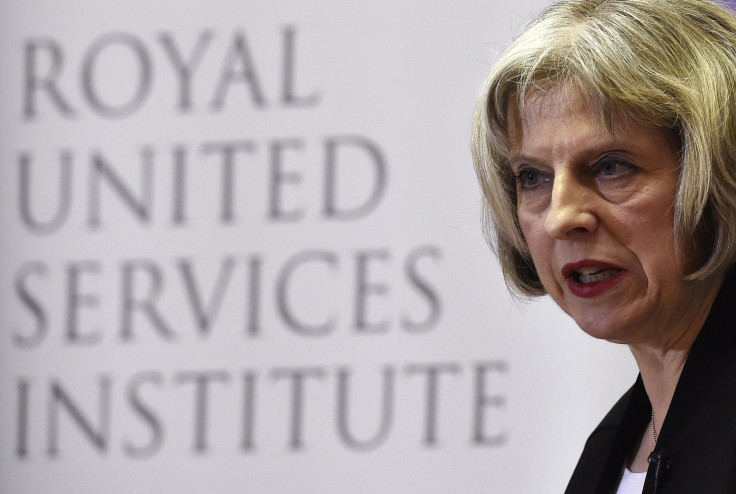UK Terrorism Law: Measures To Rehabilitate Former Terrorists Are Crucial, Says Former MI6 Counter-Terror Chief

The British Parliament will vote Wednesday on stringent new anti-terror laws aimed at stopping the flow of radicalized fighters to and from the U.K. and foreign countries where terror groups like the Islamic State group operate. Home Secretary Theresa May said the new laws would enable the British government to block and “manage” returning jihadis.
The measures labeled with the blanket term “exclusion order” let authorities strip a suspected foreign terrorist fighter, or FTF, of his ability to travel abroad or return to the U.K. unsupervised. May said Monday that FTFs “will only be allowed to come home on our terms,” according to Reuters. The measures also seek to create a system in which repentant fighters can reintegrate into society so long as they adhere to a series of requirements like monthly or weekly check-ins with authorities, or an agreement to undergo so-called de-radicalization therapy.
If authorities determine a suspect is dangerous, they will block him or her from entering the country for two years, during which the person must prove not engaging in any potential terror activities, according to the proposed law. Other parts of the legislation require Internet service providers to give information on the IP addresses of terror suspects and for schools and prisons to discourage "radicalization."
Providing a legal means to reintegrate into British society is crucial, and could particularly help would-be terrorists who realized they made a mistake, said Richard Barrett, a former counter-terrorism director at the U.K.’s spy service, or MI6. “Clearly many of those people who do go and want to come back don’t want to do stuff like [behead people],” he said. “The longer they stay out there, the longer they're likely to get pulled back. People with doubts, those who want to come home, we should allow them to do that. … Otherwise you’re just encouraging them to stay out there.”
The typical foreign fighter is between the ages of 18 and 29, according to Barrett's research. They are often disaffected and seek refuge with militant groups such as the Islamic State. The government estimated in August that around 500 British nationals had gone off to fight with a radical Islamic group and Barrett estimated that authorities know the identity of about half of them. He said it would be extremely hard for any of the 250 or so Brits who have flown under the radar to stay completely out of trouble once back home.
“If [the authorities] weren’t looking for you, people in your community still might wonder what you’ve been up to,” he said. “Everybody posts on social media and someone could say something to police. There are risks. If you manage to escape all that, then you probably aren’t much of a threat anyway, and I think it’s better that there’s a proper way to deal with that and get with the authorities.”
But Shami Chakrabarti, director of Liberty, a civil rights group in the U.K., said the measures would do more harm than good. “Dumping suspect citizens like toxic waste, abdicating your responsibilities to the international community, is a very strange way of promoting the rule of law,” she said, according to Mashable. “Summary powers to 'stop and seize' passports at airports will prove just as divisive and counterproductive as the infamous stop and search powers that preceded them.”
Margaret Gilmore, a senior associate fellow at the Royal United Services Institute in London, said the debate around the legislation is about weighing security against civil liberties. In this case, she said British voters will likely choose security. “I think the public would rather have the security,” she said. “There is a real fear that an attack is inevitable.”
May said Monday that Britain faces its greatest threat, more than “any time before or since 9/11.” Both American and British lawmakers introduced far-reaching anti-terrorism laws after the Sept. 11, 2001, attacks, some of which ended up being repealed over privacy and overreach concerns. May hopes to avoid future attacks with the security measures, Gilmore said.
Martin Polainea, a consultant with the Global Center U.K., said the measures are a necessary step in stopping foreign fighters, but that there was only so much the state could do to stop determined extremists. The exclusion orders will have to navigate a complicated jungle of international and domestic common law that prevents countries from leaving people stateless or forcing them upon other countries, he said.
Another big challenge will be how to work with other countries, specifically those within the European Union, which has to decide how to balance the sovereign rights of its members to deal with extremism against concerns over the Schengen free-movement area, which could allow aspiring fighters to travel from the English Channel shore in France to the border of Syria and Turkey with no border checks, Polaine said. How those countries handle the problem could affect how the U.K. is able to effectively implement its new measures, he said.
© Copyright IBTimes 2025. All rights reserved.






















